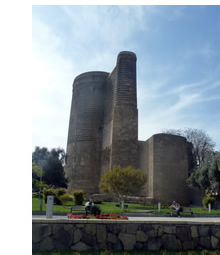
Workshop on Electronic Certificates and associated IT Systems
Baku, AZ, 2014-04-29/30

The EPPO Workshop on ‘Electronic Certificates and associated IT Systems’ took place in Baku, Azerbaijan, from the 29th to 30th of April. More than 30 experts from 14 countries, the EU Commission and the Eurasian Economic Commission participated in this Workshop.
The aim of this Workshop was to exchange experience and views about the current and future implementation of electronic phytosanitary certificates and their associated IT systems. All participants presented the existing systems that are in place in their respective countries to manage phytosanitary certificates and elaborated on how these could relate to electronic certificates (at present or in the future). The IPPC activities on the harmonization of format, content and exchange mechanisms of ePhytos were presented by Mr Horn (Chair of the IPPC steering group on ePhyto) and the participants discussed the advantages and challenges associated with the practical implementation of ePhytos. The EPPO Secretariat could also present the EPPO codes and explain how these computer codes could be used in ePhytos. The Trade Control and Expert System (TRACES) which is currently being adapted to plant health was presented by Mr Vagner (EU) and discussed.
The EPPO Secretariat wishes to thank all experts for their active participation during the Workshop. Warm thanks are due to the NPPO of Azerbaijan for the excellent organization of the Workshop, the kind hospitality and the most interesting evening visit to the old city of Baku.

Participants - View more pictures >
Conclusions from the Workshop
- ePhyto will provide benefits to plant quarantine control, NPPOs, customs control and traders. International harmonisation under the IPPC is essential for ePhyto, covering the format, content and transfer and security of the ePhyto 'message'. The workshop encourages EPPO member countries to take the next steps in the moves towards implementation of the IPPC ePhyto. Harmonisation is needed whether or not an international hub (a temporary secure repository for electronic certificates which can be accessed by a number of countries) is established to deposit and collect e-Phytos. Hubs and bilateral arrangements are not mutually incompatible.
- Use of EPPO codes for pests and hosts is strongly encouraged as the best option for international standards.
- IPPC are developing a global set of commodity codes and commodity class codes. EPPO will keep in contact with that work as it develops and experts within the region will assist. Customs’ CN codes are not tailored to phytosanitary needs, but should be used in addition to IPPC commodity codes because they form a bridge between phytosanitary documentation and Customs systems. This is particularly important where a “single window” operates for Customs and other regulatory areas.
- A lot of systems are being developed which could link in future with ePhyto:
- Some are linked to other forms of certification (e.g. Animal Health, Food)
- We need to ensure that new developments are compatible with the IPPC harmonisation of ePhyto and do not make it harder to implement in future
- We need to avoid reinventing the wheel, use components from elsewhere and continue to learn from other areas such the secure message systems used in banking
- We can draw on resources which might be available for advancing trade facilitation in general (e.g. UNCTAD, STDF).
- Some specific issues will need to be addressed by the EU in relation to how e-Phyto can be implemented within the EU, and how it will link to TRACES.
- Coding systems need to allow for uncertainty (e.g. with the possibility in EPPO codes of making entries at different taxonomic levels) but be sufficiently specific to trigger the relevant requirements (e.g. the species may determine whether a consignment is prohibited or not, so genus may not be sufficient in some cases). Codes are language independent and can in principle be decoded into any language.
- Automation can be more easily justified where transaction numbers are large. Countries do not necessarily need to establish their own systems but can collaborate or use existing systems and components. Where transactions are few or complex people may be more efficient than systems. In any case some consistency of approach is needed. The benefits are greater where systems can link with industry systems.
- Fallback arrangements need to be developed and communicated before any ePhyto system is implemented to guard against IT system failures.
- With IT developments when you start large you may end up nowhere! And what looks like one big system is usually lots of small systems successfully joined together over time. NPPOs need to know what they need and not over-elaborate. IT experts should meet the needs of NPPOs – they are not in charge!
- ePhyto does not solve all problems with issue and use of certificates which already exist with paper certificates:
- Continuing need to link certificate with physical consignment.
- Continuing need to know the importing country requirements in order to meet them.
Presentations
General presentation of EPPO – Martin Ward (EPPO)
Systems for phytosanitary certification – Nico Horn (Chair of the IPPC steering group on ePhyto)
National experiences with Phytosanitary Certificates and associated information systems: current practice and future plans
Azerbaijan – Vasila Salamova
Belgium - Leen de Rycke
Czech Republic - Michal Slanina
Estonia- Olga Junus
France - Denis Allex
Georgia - Nino Bokeria
Hungary - György Pataky
Lithuania – Lidija Necajeva (English version | Russian version)
Moldova - Alexandru Ciobanu
Netherlands – Nico Horn
Norway - Per Bratterud
Russia - Oleg Neborakov
Switzerland - Andreas Von Felten
United Kingdom - Guy Watt
EPPO codes: building blocks for ePhyto – Anne-Sophie Roy (EPPO)
IPPC harmonization of the format, content and exchange mechanisms for electronic certificates – Nico Horn (Chair of the IPPC steering group on ePhyto)
TRACES overview – Roman Vagner (EU Commission)
Implementation of TRACES for import controls in France – Denis Allex (FR)
Linking inspection and customs systems: the UK experience – Guy Watt (GB)
